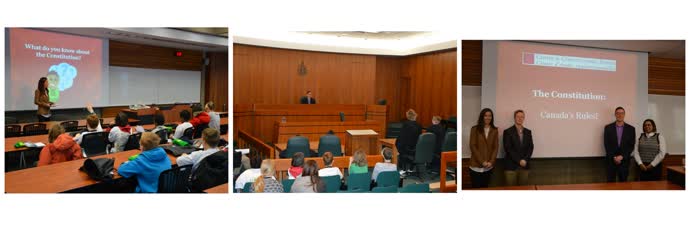
Left: 3L student Stephanie Arseneault asks Grade 6 students from Inglewood School what they know about the Constitution
Centre: 3L student Paul Welke listens as two students present their legal arguments
Right: Stephanie Arseneault, Sarah Harvey, Paul Welke, and the Centre's Tasneem Karbani (Education & Communications Coordinator)
It's not every day that a grade six student argues a position in a courtroom, but students from Inglewood School did just that as they learned about the Canadian Constitution at the Law Centre on December 2.
Fourteen students arrived at the Law Centre as part of the U School program run by the University of Alberta Senate. U School offers students in grades four through nine a week-long immersion experience on campus. Schools participating in the program generally come from socially vulnerable districts in Edmonton or from Aboriginal and rural communities within Alberta.
The Friday morning session was hosted by the Centre for Constitutional Studies. Three law student volunteers - Sarah Harvey (3L), Stephanie Arseneault (3L), and Paul Welke (3L) - led the presentation that introduced the students to the fundamentals of Canada's Constitution.
The Centre for Constitutional Studies created the special module aimed at teaching grade six-level students about the Canadian Constitution in the summer of 2014. Law students working for the Centre designed a 90-minute presentation which was then piloted between 2014 and 2016 by volunteer law student teachers.
The purpose of the Constitution Module is to teach students about the basics of the Canadian Constitution - why it was enacted, who originally participated in its formation, and to explain what political and legal structures it creates. The Centre hopes that by teaching students about the fundamental importance of the Constitution to our federal system that they will become more engaged citizens.
Effectively teaching the Constitution to this grade level has been challenging and the presentation has had several iterations since it was first piloted in 2014.
"We began with a hockey analogy - rules created for a game that cannot be easily changed and that are interpreted by referees - and with a game where groups of students representing the original colonies had to negotiate for their specific interests as our Confederation was being planned," said Patricia Paradis, Executive Director of the Centre. "We have come a long way since then with this module, and much of its development has been the result of work by our law students. We are so impressed with and grateful for their enthusiasm. One of the module's many benefits, including what the grade six students come away with, has been the deeper learning by our law students about the Constitution as they teach it."
Tasneem Karbani, Education and Communications Coordinator with the Centre, is now overseeing the project.
"Based on suggestions from the grade six teachers and from the three law students currently teaching the module, we decided to add a trip to the Moot Courtroom," she said. "It gives the students the opportunity to better understand one of the branches of government - the judiciary - that is created in our Constitution, and to actually make legal arguments about a division of powers issue - whether health care should be under federal or provincial jurisdiction, or both."
After being taught about the Constitution as a set of rules, the grade six students moved to the moot courtroom where they presented arguments to law student Paul Welke, who acted as the moot judge. The grade six students were able to present convincing arguments for their positions, leaving Judge Welke with a tough decision. He eventually reserved his judgment. Law students Stephanie Arseneault and Sarah Harvey then explained to the class how health care is actually divided between the federal and provincial governments.
The students ended the session with a loud "thank you" to their law student teachers and to program organizers. The Centre hopes that a group of educated and engaged citizens walked out of the Law Centre on December 2, understanding that in Canada, the Constitution Rules!